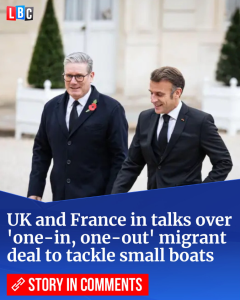
UK and France in Talks Over ‘One-In, One-Out’ Migrant Deal to Tackle Small Boat Crossings
In an effort to curb the increasing number of migrants making the dangerous journey across the English Channel, the United Kingdom and France are reportedly in advanced discussions over a controversial new immigration arrangement: a “one-in, one-out” migrant deal. The plan, if finalized, would mark a significant shift in how the two nations manage illegal crossings, and it could have lasting implications for asylum policies on both sides of the Channel.
The deal—still under negotiation—would reportedly involve the UK agreeing to legally accept a fixed number of asylum seekers directly from France for every individual France agrees to take back who arrived illegally on UK shores by small boat. The goal is to deter people from risking their lives in treacherous Channel crossings while providing a structured, legal alternative pathway for asylum.
The Growing Crisis in the Channel
The English Channel has become one of the most perilous and politically sensitive migration routes in Europe. So far in 2025, tens of thousands of people—many from the Middle East, Africa, and parts of Asia—have attempted the journey in small, overcrowded boats, often operated by smuggling networks.
The journey is notoriously dangerous. Strong tides, freezing waters, and overcrowded vessels have led to numerous tragedies, with several high-profile incidents involving loss of life gaining international attention. Despite the dangers, the flow of migrants has continued, fueled by war, persecution, poverty, and false promises from traffickers.
Both the British and French governments have faced intense domestic pressure to find a solution.
A Radical New Proposal
The “one-in, one-out” system is being framed as a bold, if controversial, approach to restoring order to the chaotic migration landscape.
Under the proposed system, for each undocumented migrant France agrees to take back—after they land on UK soil—the UK would commit to taking in one asylum seeker legally from a pool of individuals already registered in France’s immigration system. This exchange mechanism is aimed at removing the incentive for irregular crossings while still honoring international obligations to provide sanctuary for those in need.
According to UK government insiders, the deal is intended to show both compassion and control.
“This isn’t about shutting the door to those in need—it’s about slamming the door on smugglers and illegal routes,” said one official close to the negotiations.
The Politics Behind the Deal
Politically, the deal comes at a tense moment. Prime Minister [UK Leader] is under mounting pressure from the public and members of Parliament to deliver results on his promise to “stop the boats.” With national elections looming, the UK government is keen to demonstrate progress on an issue that resonates deeply with voters concerned about border control and immigration.
In France, President Emmanuel Macron faces his own domestic pressures, particularly from conservative critics and far-right groups who argue that France bears a disproportionate burden of the EU’s migration crisis. Collaborating with the UK to reduce crossings could help him reassert control over the narrative ahead of key regional elections.
Still, both leaders know they are walking a tightrope. Any agreement that appears to shift burdens unfairly or violate refugee rights could trigger legal challenges and political backlash.
Legal and Ethical Questions
Human rights groups have already raised red flags about the proposal. Critics argue that a “one-in, one-out” policy risks turning asylum into a numbers game, ignoring the individual merits of each case and potentially violating international refugee law.
“Asylum is not a tradeable commodity,” said Clare Mosley, founder of refugee charity Care4Calais. “You don’t protect one person’s life by denying another’s. Every individual has the right to seek refuge and to have their claim heard fairly.”
Others fear the deal may disproportionately affect the most desperate migrants—those who lack access to formal refugee channels and feel forced to take illegal routes.
Furthermore, legal experts warn that any such agreement would need to comply with the European Convention on Human Rights and the 1951 Refugee Convention, both of which prohibit collective expulsions and require fair consideration of asylum applications.
Logistical Challenges Ahead
Even if both governments agree in principle, implementing the plan will be no easy feat. Officials would need to create a new infrastructure for the exchange system, including vetting procedures, legal frameworks, transportation logistics, and border processing coordination.
In addition, both countries would have to agree on who qualifies for the legal resettlement pathway. Would it include only those already registered in France’s asylum system, or would other categories—such as vulnerable women and children—be prioritized?
There are also serious questions about how returnees would be processed by France. Would they be held in detention? Could they reapply for asylum in France? Would they face deportation to their country of origin?
As one French official admitted anonymously:
“The devil is in the details. This is not something that can be rushed.”
International Implications
The deal, if successful, could become a model for similar bilateral agreements across Europe. With migration pressure rising not just in the UK and France but across the continent, several EU nations are considering new border arrangements and offshore processing ideas.
Australia famously adopted a controversial “stop the boats” policy in the 2010s that included turning back vessels and processing asylum seekers in offshore centers. While the policy reduced crossings, it drew condemnation from international rights bodies.
The UK and France are hoping their approach will offer a more humane, cooperative model—one that deters illegal routes while preserving safe access for legitimate refugees.
Public Reaction
The public response has been sharply divided. Supporters of the deal argue it’s long overdue and could finally bring an end to the deadly crossings that have plagued the Channel.
“It’s a sensible step forward. We can’t allow smugglers to decide who gets in and who doesn’t,” said one caller on a popular UK radio show.
But critics, especially refugee advocacy groups and some members of Parliament, view it as a dangerous compromise that risks human lives and rights.
“This is not leadership—it’s a numbers game,” tweeted one UK opposition MP. “We need compassion, not accounting.”
Conclusion
The proposed “one-in, one-out” migrant deal between the UK and France represents one of the most dramatic efforts to address irregular Channel crossings in years. By attempting to balance deterrence with legal migration pathways, the plan walks a tight line between practicality and principle.
Whether it becomes law or falls apart under political pressure remains to be seen. But one thing is certain: the migration crisis in the Channel is far from over, and both nations are feeling the weight of finding a lasting, humane solution.
